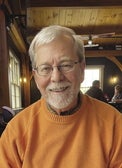Johnson leaves Becker with bigger endowment, smarter students
Becker College was in dire straights. Kenneth Zirkle, its president, left abruptly for another school in 2008, right around the same time that the school's chief financial officer and accounting firm also departed. The Great Recession had just struck.
“At the time, Becker was adrift,” said Arthur “Jay” DiGeronimo, chairman of the Becker board of trustees. “We knew we had some positive aspects of the school, but they were inarticulate; and resources weren't directed to growing the school in the right direction.”
DiGeronimo was on the search committee that found Zirkle's replacement, a man named Robert Johnson, a senior vice president at Sinclair Community College in Ohio.
Johnson stood out to DiGeronimo right away. The candidate asked incisive questions about those interviewing him and about the college instead of, as the trustee put it, talking about how great he was.
“It's hard to briefly describe the transformation Becker College has made under his presidency,” DiGeronimo said.
Even now, Johnson recalled how bad things were then. Becker was two or three student recruiting cycles away from going out of business, he said.
Creating agile minds
Johnson left the school on May 8 after leading it for seven years, and will become chancellor of UMass Dartmouth on July 1. Nancy Crimmin, Becker's senior vice president and chief academic and student affairs officer, has been named interim president.
If there's one thing Johnson – a 57-year-old Michigan native – accomplished at Becker, it is what the college calls agile mindset.
Becker appears to be at the forefront in higher education of a school of thought that students shouldn't just be taught to their major or to basics like math and English but also what Johnson calls robot-proof skills.
Under Johnson, Becker replaced several general-education requirements with courses on empathy, entrepreneurship, social and emotional intelligence, and divergent thinking, or solving problems in different ways. Each student takes those courses.
“We're educating young people for jobs that do not yet exist, to solve problems that we've yet to identify, utilizing technology that hasn't been created,” Johnson said, using the phrase more than once as he described the forward-thinking way Becker's tried preparing its students for whatever job awaits them.
Johnson spends a lot of time thinking about how industries have been disrupted by new technologies over generations. He name-drops innovators like Henry Ford, Thomas Edison and Elon Musk, and recites how industry employment has changed because of technological advancements.
Disruptors, as Apple or Amazon are known, show that higher education can't and won't remain the same forever either, Johnson said.
Landing on more solid footing
Becker – where 62 percent of students major in animal studies, interactive entertainment or nursing – has done well during Johnson's tenure, with improving finances (tripling the endowment) and student scores (SAT scores rose 12 percent).
The Princeton Review has named Becker a “Best College” for undergraduate education for five straight years, and last year, its video game design program was ranked fifth best in the world. This school year's enrollment of more than 2,100 was the college's highest ever.
But challenges remain. The school's graduation rate, at only 31 percent, trails the national average, while its cost, $54,000 for residential students this upcoming fall, is higher than the national average of $45,000, according to the College Board. Those were among the factors that in 2014 landed the college sixth of Washington Monthly's “Worst Colleges” list.
Graduation rates are improving, Johnson said. A projected graduation rate for new students is now 49 percent, he said, citing a Higher Education Research Institute model.
“The school has a unique culture,” said student Chad Taylor, a Connecticut native studying business. Taylor, a resident assistant, has worked with Johnson in his role known as a presidential ambassador, a type of outreach position between the college and student groups.
“He's honestly one of the best people I've met,” Taylor said. “He's sincere.”
A Worcester legacy
Johnson became rooted in Worcester during his time at Becker. His wife, Michelle Jones-Johnson, is the vice president for talent development and chief diversity officer at Worcester Polytechnic Institute. The couple has two children in college in the Boston area.
Johnson has also been active in the city, serving on various boards, including on the Saint Vincent Hospital Governing Board and as the chairman of the Worcester Regional Chamber of Commerce.
Tim Murray, the chamber's president and CEO, said he was first impressed by how impactful Johnson could be when Murray was lieutenant governor and working with Becker to create MassDiGI, the Massachusetts Digital Games Institute, which Becker calls a first-of-its-kind video game incubator.
“He was just relentless in terms of his advocacy,” Murray said, also praising Johnson's work with the business and higher education communities.
“He's one of these people who can just speak the language and work in the world of the business community and higher education and get both worlds to understand each other,” he said. “It's a unique skill set he brings in that regard.”
The next challenge
Johnson will lead a much bigger institution in UMass Dartmouth, challenged by flat enrollment of 8,647 this year and a law school, UMass School of Law, striving to overcome budgetary woes. It became the state's only public law school in 2010.
While Becker is one of several colleges in Worcester, UMass Dartmouth has an outsized role on its region, as the only four-year school close to the cities of Fall River and New Bedford.
“Someone handed me the baton with the institution when I came. I think it's now time for me to pass it along to someone to help it to evolve to that next level,” he said of leaving Becker.
Johnson never intended on a career in higher education – “Are you kidding me?” he remembers asking – until a family connection, a college president in Ohio, offered him a job while Johnson earned his master's degree. After seeing the administration work closely firsthand, he was sold.
“I was seeing it and experiencing it in ways that, you can't learn it in a handbook. You can't learn it in a class,” Johnson said. Like that, he was sold on his career.
When Johnson was offered the UMass Dartmouth chancellorship in March, he called it his greatest honor to call his father and tell him the news. His father, a Korean War veteran who never finished college, was fixated, the younger Johnson said, on several colleges, including UMass.
“You could just hear it in his voice,” Johnson said of telling his father the news, becoming emotional in describing the pride he said his father feels at the UMass job.
“Rarely ... do we as kids have the opportunity to do something that you can just see with your parents what it does for them in a very, very positive way,” Johnson said.



















0 Comments